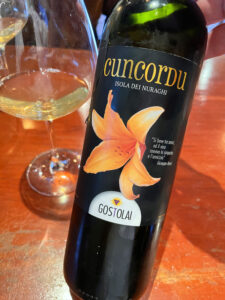2018 Cantina Gostolai, Concordu, Arvesiniadu, I.G.T. Isola dei Nuraghi Bianco, Sardinia, Italy.
The Cantina Gostolai, based in Nepente di Oliena in the northeast side of Sardinia, is mostly known for their Vermentino di Sardegna and Cannonau (Grenache) di Sardegna wines, but they also produce small real rarities as well, including a sweet Muscat and this almost unheard of local varietal Arvesiniadu, a grape not found anywhere else, so unique and rare, it is not even on the list of approved grapes! Gostolai’s Concordu Arvesiniadu is a glowing gold and yellowish in the glass with a fine dry stony character and mineral driven with light to medium body and a touch of phenolic extract showing a mix of citrus and stone fruits along with a hint of dried mango and lingering quince. With air, this 2018 vintage begins to show secondary elements with a touch of earth and waxy notes, gaining some alpine herb and flinty spices. These are the kind of wines that I live for and I am grateful to Italian sommelier and Sardinian native Giuseppe Cossu for sharing this unique white wine with me and trying his best to educate me on the incredible history of wine on Sardinia, separating the truth from myth and giving me an exciting new wine to research and write about, grazie Giuseppe! The Arvesiniadu, which first documented back in 1780 by writer Andrea Manca dell’Arca in his work on Sardinian agriculture, is found only on the island of Sardinia, particularly in the historic region of Goceano in the communes of Benetutti and Bono, where they high elevation vineyards set on complex soils that include red volcanics that are iron rich as well as limestone or dolomite. According to vine researchers, the Arvesiniadu has no generic relationships to any know vinifera, meaning we haven’t found a match or parent yet, which adds to the mystery that this island presents. Sardinia’s collection of grapes and wines are all noteworthy and while most people will have had Vermentino from the Island, and it may be their signature wine, it is not by any means the only star here and Sardinia has many distinct terroirs and climates that have a huge range of soils from ancient volcanic to deep sands that all give very individual flavors to the wines here.
As of 2015, there were only 20 hectares (49 acres) of the Arvesiniadu grape planted on the island and while historically it is usually blended with other white Sardinian varieties like Malvasia, Nuragus and Vermentino, it has also been used in making late harvest sweet wines and passito. It is more rare to be a single varietal dry white wine, so it was fascinating to try this 100% Arvesiniadu, uva nativa della Sardegna, version by Gostolai, which was fermented bone dry and was done completely in stainless steel. The wine making here was pretty standard, but for the fact that they whole cluster pressed the freshly picked grapes and allowed a short period of skin contact, lasting a few hours before being moved to the temperature controlled stainless vats. This short skin contact allows for a touch more pigment, extract and structure, enough to be noticeable on the palate, but not as long as to be an orange wine or pick up any harsh or savory edge, though adding an extra degree of complexity. Sardinia has some of the longest history in wine growing of all of western Europe and while still controversy still persists, it could be the home or birth place of commercial wine trading in the Mediterranean, predating the Geeks, the Etruscans (who came to both Sardinia and Corsica) and likely thousands of years before the Romans, as new discoveries have shown it might just be the place where Grenache, known locally as Cannonau, is originally from, though the Spanish still claim it as theirs. Little is really known this Arvesiniadu grape outside of the island, but I found it to resemble some less aromatic alpine grapes like Chasselas, Jacquère and Altesse, which are common to the Savoie region of the French Alps. The name of this wine, also has uniquely native roots, as Cuncordu is a sacred folk music style of Sardinia, it is sung with regular voices, and the tenore is a more ancient using overtone singing or throat singing, here it is maybe referring to the joys of this uniquely Sardinian grape. This stuff, that would be delightful with soft cheeses and seafood dishes, will probably be a hard find, but if you are in the need of something absolutely authentic to Sardinia it will be worth the challenge. I see a few listings for this Gostolai Arvesiniadu, as well as the blended version, and even some with more age, which would be interesting as well.
($25 Est.) 90 Points, grapelive
